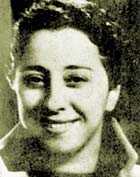Nazik Al-Malaika
| Nazik Al-Malaika | |
|---|---|
 | |
| Born |
August 23, 1923 Baghdad, Iraq |
| Died |
June 20, 2007 (aged 83) Cairo, Egypt |
| Nationality |
|
Nazik Al-Malaika (August 23, 1923 – 20 June 2007[1]) (Arabic: نازك الملائكة), Al-Malaika in English: Angels, she was an Iraqi female poet and is considered by many to be one of the most influential contemporary Iraqi female poets. Al-Malaika is famous as the first Arabic poet to use free verse.[2]
Early life and career
Al-Malaika was born in Baghdad to a cultured family. Her mother was also a poet, and her father was a teacher. She wrote her first poem at the age of 10.[2] Al-Malaika graduated in 1944 from the College of Arts in Baghdad and later completed a Master's degree in comparative literature at the University of Wisconsin–Madison with a Degree of Excellence.[3] She entered the Institute of Fine Arts and graduated from the Department of Music in 1949. In 1959 she earned a Master of Arts in Comparative Literature from the University of Wisconsin in the U.S., and she was appointed professor at Baghdad University, the University of Basra, and Kuwait University. Her father was a teacher .
Poet and teacher
Al-Malaika published several books of poems:[4]
- her first book of poetry "Ashiqat al-Layl" ("Night's Lover(female)") after her graduation.
- She wrote "al-kolera" (Cholera) poem which considered by critics as a revolution in the Arabic poem in 1947.
- "Shazaya wa Ramad" ("Sparks and Ashes") followed in 1949.
- She published "Qararat al-Mawja" ("Bottom of the Wave") in 1957.
- her final volume "shagrt al-qamar" ("Tree of the Moon") being published in 1968.
- "wa yu3'ayer alwano albahr" ("And the sea change his color") in 1970 .[5]
- Al-Malaika taught at a number of schools and universities, most notably at the University of Mosul.
Leaving Iraq
Al-Malaika left Iraq in 1970 with her husband Abdel Hadi Mahbooba and family, following the rise of the Baath Party to power. She lived in Kuwait until Saddam Hussein invaded that country in 1990. Al-Malaika and her family left for Cairo, where she lived for the rest of her life. Towards the end of her life, Al-Malaika suffered from a number of health issues, including Parkinson's disease.[2]
She died in Cairo, Egypt in 2007 at the age of 83.[1]
References
- ↑ 1.0 1.1 International Herald Tribune
- ↑ 2.0 2.1 2.2 AP via The Guardian, "Iraq Poet Nazik Al-Malaika Dies at 85" June 21, 2007
- ↑ aljazeera.net flash
- ↑ Arabic pages at wiki ar
- ↑ Maquis Who's Who, 2006 "Nazik Al-Malaika" and Guardian Op Cit.
External links
|